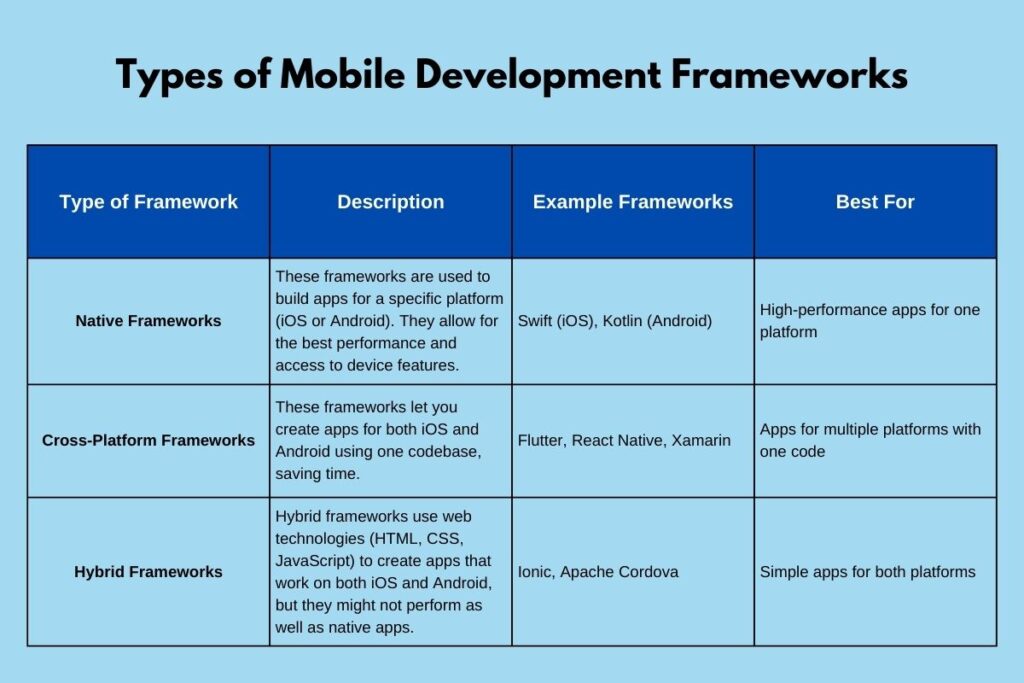What is the Mobile Development Framework?
Let’s suppose you are trying to put together a complex machine without any instructions or tools, it would be a tough job. Creating mobile apps without the right resources is just as challenging.
This is where a mobile app development framework comes in, providing developers with the essential tools to build high-quality apps efficiently. But what is a mobile development framework, really? Simply put, it’s a platform that offers pre-made components, code libraries, and tools to make app development faster, easier, and more organized. Whether you’re building for Android, iOS, or both, frameworks help save time and ensure your app performs well.
Key Takeaways
➡ Frameworks offer pre-built components, templates, and tools, allowing developers to quickly build apps without starting from scratch.
➡With frameworks like Flutter and React Native, developers can create apps for both iOS and Android using a single codebase, reducing time and effort.
➡ Frameworks provide built-in tools for real-time testing and error detection, improving the app’s performance and user experience.
➡ Updating apps across platforms is streamlined by updating the shared codebase, ensuring changes apply to both iOS and Android simultaneously.

How Mobile Development Frameworks Simplify the Development Process?
Building a mobile app can be a complex and time-consuming task, especially when starting from scratch. However, by using a mobile application development framework, developers can streamline the entire process, making it quicker, easier, and more organized. Below, we’ll explore how these frameworks simplify the mobile development journey.
1. Pre-Built Components for Faster Development:
One of the biggest advantages of a mobile application framework and tools is the availability of pre-built components and templates. These include user interface (UI) elements, buttons, navigation bars, and more. Rather than coding these elements from scratch, developers can simply plug them into their app. This reduces development time and allows teams to focus on customizing and enhancing the app’s functionality.
- Example: Instead of designing custom buttons for every screen, a framework like React Native offers ready-to-use components that developers can adapt to their needs.
2. Cross-Platform Development Made Easy
A key benefit of many modern frameworks is the ability to create apps for both Android and iOS with a single codebase. With tools like Flutter or React Native, developers no longer need to write separate code for each platform, saving significant time and effort.
- How It Helps: Instead of maintaining two different codebases (one for iOS and one for Android), developers can write code once and deploy it to both platforms, ensuring consistency across the board.
3. Simplified Testing and Debugging
Testing and debugging are crucial steps in the development process. Mobile development frameworks offer built-in testing tools and error detection features that make this process smoother. By using these tools, developers can catch bugs early, ensuring better app performance and a smoother user experience.
- Example: Frameworks like Xamarin and Flutter come with tools that help in real-time debugging and testing, streamlining the overall testing process.
4. Access to Device Features Without Extra Coding
A mobile application development framework provides easy access to native device features such as the camera, GPS, and sensors. These frameworks offer plugins and libraries that make it easier to integrate device-specific functionality into the app, without requiring developers to dive deep into complex platform-specific code.
- How It Helps: Instead of manually writing code for each device feature, developers can use built-in functions or third-party libraries to add these features quickly and efficiently.
5. Better Collaboration and Community Support
Most popular mobile frameworks come with large, active communities. These communities offer support, tutorials, and shared solutions to common problems. Developers can rely on community resources to solve challenges faster, instead of figuring things out on their own. This community-driven support can significantly reduce the time spent troubleshooting issues.
- Example: Frameworks like React Native have extensive community forums where developers share code snippets, tutorials, and best practices, making it easier to overcome obstacles during development.
6. Easier Maintenance and Updates
After the app is built, regular maintenance and updates are necessary to keep it running smoothly. Using a mobile application framework and tools makes it easier to update the app across both iOS and Android simultaneously. Developers only need to update the shared codebase, and the changes automatically apply to both platforms.
- How It Helps: This ensures that any improvements, bug fixes, or new features are rolled out across both platforms quickly, reducing the effort required for updates.
- 💡White Label Mobile Apps vs. Custom Mobile Apps – Click to Read More
Conclusion:
In conclusion, understanding what is a mobile development framework is key to streamlining the app development process. Whether you’re building for a single platform or targeting multiple platforms, a mobile application development framework offers essential tools and resources to save time, improve app performance, and simplify testing and maintenance. By leveraging these frameworks, developers can focus on delivering high-quality, feature-rich apps while taking advantage of built-in components, community support, and cross-platform compatibility. Selecting the right framework ultimately depends on your project’s specific needs, but with the right tools, developing mobile apps has never been easier.
FAQS About Mobile App Development Framework
What is the difference between a native, hybrid, and cross-platform framework?
Native frameworks are used to build apps for a single platform (iOS or Android), offering the best performance. Hybrid frameworks use web technologies to create apps that work on multiple platforms but may have performance limitations. Cross-platform frameworks allow you to write one codebase for both iOS and Android, offering a balance between performance and efficiency.
Which mobile development framework is best for beginners?
React Native and Flutter are great choices for beginners due to their large community support, comprehensive documentation, and ease of use for building cross-platform apps.
Can I create an iOS and Android app with the same codebase?
Yes, using cross-platform frameworks like Flutter or React Native, you can write one codebase that works on both iOS and Android.
How do I choose the right mobile development framework for my project?
Consider factors like platform compatibility, performance needs, budget, development speed, and community support to select the best framework for your specific project.








